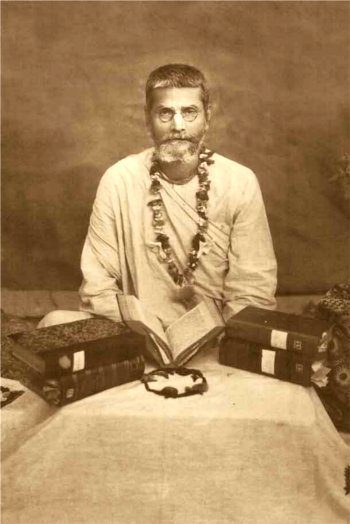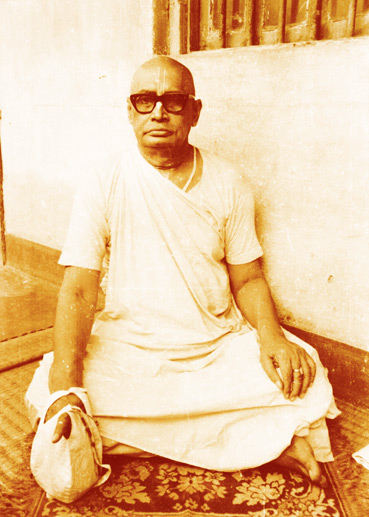śrī śrī guru gaurāṅga jayataḥ!

Year 12, Special On-line Edition
Posted: 12 February 2020
Dedicated to
nitya-līlā praviṣṭa oṁ viṣṇupāda
Śrī Śrīmad Bhakti Prajñāna Keśava Gosvāmī Mahārāja
Inspired by and under the guidance of
Śrī Śrīmad Bhaktivedānta Nārāyaṇa Gosvāmī Mahārāja
The 26 Transcendental Qualities of Vaiṣṇavas
As Observed in my Śrī Gurupādapadma:
Śrīla Bhakti Prajñāna Keśava Gosvāmī Mahārāja
by Śrī Śrīmad Bhaktivedānta Vāmana Gosvāmī Mahārāja
An excerpt from the article “The 26th Year of Śrī Gauḍīya Patrikā”
 |
 |
When Śrī Gurupādpadma was residing at the establishment of his guru – Śrīla Prabhupāda Sarasvatī Ṭhākura – (guru-graha), several heretics also lived there. As guru-bhogīs they enjoyed the facilities provided by their guru [Śrīla Prabhupāda], and as guru-tyāgīs they did not pay heed to the life and precepts of their śrī guru. They even obstructed and hindered Śrī Gurupādpadma’s viśrambha-guru-sevā*. Still, he was akṛta-droha [1] – his conduct with them was without malice and he did not hurt them.
__________
* Viśrambha-guru-sevā is performed by one who knows the heart of his gurudeva and can render intimate sevā to him accordingly. Although it is not possible for a conditioned soul to obstruct such sevā, these incidents nevertheless revealed the great determination of Śrīla Bhakti Prajñāna Keśava Gosvāmī Mahārāja to serve Śrīla Bhaktisiddhānta Sarasvatī Ṭhākura Prabhupāda.
When any offender acknowledged his own fault, Śrī Gurupādpadma would forget the offender’s transgression. In this way, as the embodiment of forgiveness, he was supremely compassionate – kṛpālu [2].
His integrity – satya-niṣṭhā [3] – is well known; he never tolerated wrongdoings. He was harder than a thunderbolt. Yet, to the same degree, he was more tender than a flower and his nature was simple. Selfish people were afraid of him.
He was equanimous – sama [4] – toward everyone; he addressed even a child as āp [the honourific form of the pronoun “you”].
He was never enamored by kali-pañcaka [gambling, intoxication, illicit relationships, gold or wealth]; hence he was nirdoṣa [5] – faultless and innocent.
He helped his god-brothers and dependents generously when he himself was free from debt.* He never permitted inappropriate conduct, and he continually headed a movement of non-cooperation against the practices of prākṛta-sahajiyās (capricious imitationists). Having practised and preached pure bhakti (śuddha-bhakti) throughout his entire life, he established the significance of the term mahā-vadānya [6] – extremely magnanimous.
__________
* In those times, it was always a financial strain on the mission to perform preaching and other activities. Śrīla Bhakti Prajñāna Keśava Gosvāmī Mahārāja would take out a loan for his massive seven-day Navadvīpa parikramā, for which he charged no fee, and he would even pay for those who had no money to travel there. After parikramā, he and his disciples and followers would preach tirelessly and collect to pay that debt. At those times, when he was free from debt, he would help his god-brothers and dependents generously.
His strong moral principles in regard to dharma and adharma always amazed the entire Gauḍīya Vaiṣṇava society. Such a soft natured – mṛdu [7] – and calm personality is rare in this world. Those enchanted by his qualities and those who were the recipients of his mercy would consider him a transcendental and affectionate father who bestows prema-bhakti.
He was immaculate – suci [8] – being always engaged in śrī nāma-bhajana. He never paid heed to the so called pure and impure conceptions of karma-jaḍa-smārta sampradāya [materialistic priests who engage in mundane, karmic rituals] engaged in mundane ritual.
“No one other than Śrīla Gurudeva is our protector.” Being imbued with this feeling, he possessed the quality of akiñcana [9] – freedom from a sense of possessiveness born of full surrender.
Because his disposition was to be sarvopakāraka [10] – concerned for the welfare of all – he always reflected on how all the jīvas of the world would, by hari-bhajana, be delivered from nescience (avidyā), or forgetfulness of Kṛṣṇa. And because he was always one-pointedly absorbed in kṛṣṇa-sevā and devoid of all material desires and longings, he was never observed to be in want of mental peace – he was always śānta [11].
His high level of dependency on his īṣṭadevas – śrī guru and Bhagavān – was most astonishing. When he left the mission of his gurudeva, which was embroiled in dispute, he did not take a single penny with him. Once, while in the Kolkata maṭha [at a time when he did not have enough money to serve his dear god-brother who was visiting], he cried with a choked voice and with tears flowing from his eyes, “Hā Prabhupāda!” and then a bird sitting in the lofts of the maṭha helped him by dropping a small bundle of coins. He thus accepted Kṛṣṇa as his only shelter – kṛṣṇaika-śaraṇa [12]. Consequently, his life fully reflects the ideal character of bhakta Kureśa.
By establishing service to the ever-youthful, conjugal divine couple, Śrī Śrī Rādhā-Vinodabihārī-jiu, he imparted teachings on selfless – akāma [13] – kṛṣṇa-bhajana. All of his endeavours were for the sake of Kṛṣṇa, and thus he inspired everyone to perform bhāgavata-bhajana. In this way, his life passed with simplicity and without desire – anīha [14].
He never deviated from the teachings of Śrī Gurudeva and he never abandoned the ideal shown by him. With a firm – sthira [15] – vow of service to Śrī Mukunda, he carried a begging-bag over his shoulder, free from all embarrassment and humiliation.
He was never disturbed by thirst or hunger or a greed for wealth and so forth; thus, as vijita-ṣaḍ-guṇa [16], he was jitendriya-gosvāmī – one who conquered lust, anger, greed, delusion, pride and envy.
He never approved of the efforts to collect more than necessary (atyahāra) nor did he contemplate gratifying the senses with dietary and recreational habits; therefore, he was mita-bhuk [17].
“Guror ājñā hy avicāraṇīya – the instructions of gurudeva are to be followed unhesitatingly and without deliberation.” He was bound in his vow to follow and execute, in every respect, the orders and directions of Śrī Gurudeva – Śrīla Prabhupāda. He was therefore apramatta [18] – extremely cautious and sober, not calculative or whimsical.
Because, in the realm of spiritual relationships, he respected everyone in accordance with their position, he was mānada [19].
Being devoid of all desire for mundane profit, adoration and recognition, he protected all conventions of varṇa and āśrama and embodied the significance of the word amāni [20] – without desire for respect.
He was completely immersed in the conceptions of the svarūpa-rūpānuga line and properly followed the āmnaya-vāṇī (message of śrī guru-paramparā). He refuted ādhyakśika (direct, indirect and indistinct) knowledge. He accepted in every respect the sole guidance of his śrī gurudeva and acquainted us with his gambhīra [21] – profound nature.
With the sole objective of delivering the conditioned souls – who are gripped by trifling things and scorched by three-fold miseries – in every village, town and holy place and throughout India, he preached śrī nāma-prema, he composed and published scriptures and he established spiritual education centres (maṭhas) and places of worship (temples), which revealed his karuṇā [22] – supremely compassionate nature.
Kṛṣṇeti yasya giri. In accordance with this verse of Upadeśāmṛta, for the welfare of the sādhakas and sādhikās and all his dependents, as well as to serve the perfected devotees of Bhagavān – his god-brothers – his doors were always open. He was prepared to sacrifice his life for the welfare of those bound to him by the thread of love. This was the hallmark of his maitri [23] – friendship.
His compositions – “Śrīla Prabhupāda’s āratī”, “Śrī Tulasī āratī”, “Śrī Gaura-Govinda āratī”, “Śrī Rādhā-Vinoda-bihārī tattvāṣṭakam”, “Advaitavāda-sānkhyamat-nyāymatduṣanam” and so forth – acquaint us with his potency of kavitva [24] – transcendental poetry.
He was proficient – dakṣa [25] – in all subjects, which is why Śrīla Prabhupāda adorned him with the title Kṛti-ratna. Because he was particularly lucid in regard to social policy and economics, as well as the management and objective [of Śrīla Prabhupāda’s mission], and because of his spiritual prudence, he was the Superintendent General of the undivided Gauḍīya mission.
Since harikathā-kīrtana was the sole aim of his life, he conquered the urge to speak, thus demonstrating the significance of the word maunī [26]. He would always stay far away from the line of thought of non-devotees and materialistic people, who are absorbed in topics unrelated to Bhagavān.
In essence, insignificant writing and language are always incapable of describing the transcendental qualities of Śrī Gurupādpadma.
Translated from Śrī Gauḍīya Patrikā, Year-26, Issue-1
By the Rays of The Harmonist team





